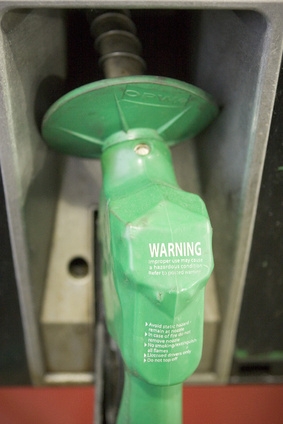
The Geo Metro first appeared on North American soil in 1989. It was a direct descendant of the Suzuki Cultus, and was powered by a 1.0-liter 3-cyclinder engine. This motor pumps out 55 horsepower. The 3-cylinder Metro averages 38 miles per gallon (mpg) in the city and 44 mpg on the highway. The problem with these 3-cylinder engines was that as they racked up mileage they vibrated more and fuel efficiency decreased. To combat this, in 1995 General Motors switched the engine to a 4-cylinder 1.3l motor. If you are an owner of a 3-cylinder Metro, there are some steps you can take to increase fuel efficiency.
In the U.S., these 3-cylinder cars are at least 15 years old, so regular maintenance is essential. They are also known for problems with the fuel-injection system as they age. Check and replace spark plugs as required. Replace air filters as needed. According to the Federal Trade Commission (FTC), a well-tuned engine can improve mileage by 4 percent.
Change your oil as required and use the correct grade. Also check your oil and fuel filters. According to the U.S. Department of Energy (DOE) and Environmental Protection Agency (EPA), replacing clogged filters can increase gas mileage up to 10 percent.
Listen to your engine. Some Geo models came with an Exhaust Gas Recirculation (EGR) valve. The EGR valve helps cars to completely burn fuel by re-circulating a portion of the car's exhaust and running it through the combustion process again. It also decreases noxious emissions by stopping the formation of dangerous gases. When the EGR valve is clogged or malfunctioning, it can cause irregularities in engine performance such as rough idling or valve knock, indicating that the EGR valve should be inspected. Should you notice your engine idling rough or knocking in your engine, let your mechanic take a look. This could lead to reduced fuel economy and other problems.
Check your tires and make sure that they're aligned and properly inflated. Under-inflated wheels cause unnecessary rolling resistance. According to the FTC, properly inflated tires can increase gas mileage by 3 percent.
Do not idle. If you are going to be waiting a few minutes, turn your engine off. It will save you money and help the environment.
Watch your car's weight. Clearing your car of unnecessary clutter is one of the easiest ways to increase fuel economy. According to the FTC, an extra 100 pounds of weight in the trunk can decrease your mileage performance by two percent.
Some Geo models came with an Exhaust Gas Recirculation (EGR) valve. The EGR valve helps cars to completely burn fuel by re-circulating a portion of the car's exhaust and running it through the combustion process again. It also decreases noxious emissions by stopping the formation of dangerous gases. When the EGR valve is clogged or malfunctioning, it can cause irregularities in engine performance such as rough idling or valve knock, indicating that the EGR valve should be inspected. Should you notice your engine idling rough, or knocking in your engine, let your mechanic take a look. This could lead to reduced fuel economy and other problems.